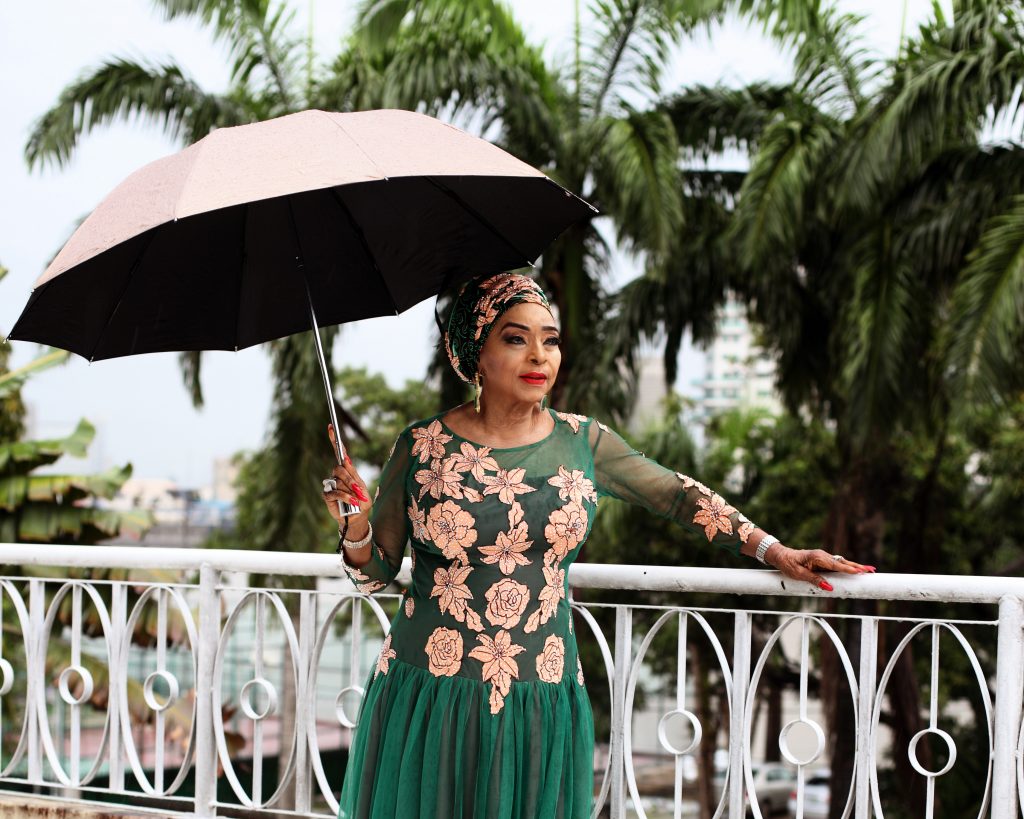Abah Folawiyo: Fashion Icon @ 75 And Still Going Strong

Abah Folawiyo is one of the iconic names that headlined the Nigerian Fashion industry back In the 70s, spearheading a fashion revolution that embraced the beauty of our local Ankara fabric, that has today become a favorite for all. Famously known by her brand name then, Labanela, no designer’s work and personal style is as synonymous with glamour as Abah. As she turns 75 this July, she relives her past memories and challenges as a designer, life as the widow of late business mogul Wahab Folawiyo, her expectations for the fashion industry amongst others..
You turned 75 today, how does it feel to be 75?
I feel the same by the grace of God. The way I feel when I was 50, 60, 70, and now 75. I feel the same, nothing has changed.
How do you take care of yourself now, in your diet and health?
Well I have changed my diet. I no longer eat all the things I used to eat before now. Things like Garri and all. This diet change has also helped me lose so much weight, which I like, as I am now quite light. I do not eat Eba and pounded yam anymore. And I eat twice a day, I have my breakfast and dinner, I take my dinner is as early as 7pm.
What do you like for breakfast and dinner?
For breakfast, I can eat anything. Although I don’t eat eggs. Sometimes I eat potato, boiled sweet potato, boiled yam or kenke, fried fish and pepper.
Do you go to the spa?
Well, I was not a spa and beauty person so nothing has really changed. All I do is take a good bathe, I don’t believe in spa and all the beauty treats.
So what is life like after your husband’s death. How has life treated you?
Well I thank God. I am still alive and I am still looking very healthy, so I thank God. But I miss him a lot. I really miss him because he was a good husband to me. But his children have taken over. They’re really taking care of me. So I don’t have any cause to complain, but I regret that he died.
What do you miss mostly about him?
That will be his sweetness, kindness, and his care. He took care of me very well. He didn’t joke with me, he pampered me a lot. He was not a troublesome husband and was very quiet.
You started the fashion industry years back with some of your contemporaries,
How would you describe the industry then and now?
When I started, fashion was not very much in vogue. People were not appreciating fashion designers then. They were importing clothes, ready-made clothes were coming in freely. Then I started making designs with our local prints, I started with our prints and cotton, but they were not appreciated then, until Obasanjo banned the importation of ready-made fabrics and clothes, that was when people realized there are designers here, and they started patronizing me. That was when the business started booming. I am very pleased that things are different now. There are lots of designers now and that work with our prints and they are doing very well in Nigeria and I appreciate all the designers and dressmakers.
We still have an issues with making fabrics in Nigeria because a lot of people will rather not patronize Nigerian fabric because they are low quality. What do you think?
No, the fabrics are very good now, they are fantastic. There are good made in Nigeria fabric, but many people don’t appreciate it. You know Nigerians like importing things, and they should stop because we have a lot of things here in Nigeria, the prints they make here are sold for N1000 to N1500, but they would rather buy Hollandis for 30, 50 thousand, that means they’re original. They don’t know that you can use the same inexpensive print to make the same design and it will look even better. Which is what I do a lot. I use lots of cheap fabrics and if you’re a designer you should be able to use any fabric, no matter how cheap, Nigeria is trying, same with the designers, but it’s just that people don’t appreciate what we do here.
So if you want to advice the government on ways to improving the fashion industry to create revenue for the country, what would you tell them?
Well, I must say the government is not doing enough. They are trying , but they are not doing enough. Because I know that FADAN (fashion designers association of Nigeria) have been all over, the government trying to get them to help the Industry one way or the other, but they have been very adamant about it. They do not take the fashion industry seriously at all, they would rather pay attention to the music industry, which is wrong. So I would advice that the government should focus just a little bit on the fashion industry because, it is a money spinner. Other countries make lots of money from their fashion industry. They make lots of money with designers. My hope is that someday the government will appreciate and support the industry and take it beyond what it is now.
Do you still sew your clothes?
I do sew some of them, I do make them. I have a lot of designers that I groomed and they all love me, so whoever I pick to make a dress that I love , they will make it for me. And sometimes I give them my own design and tell them to make it for me and they do.
Speaking about designs, do you still have inspirations? How does it come?
Of course I do, that will never go. I don’t really know where I get inspirations from, they just come. When I see the fabrics, straight away I know what I want to do with the fabrics. It just comes naturally.
When you are not working how do you love to relax?
I watch Nigerian movies; Yoruba and English movies, I watch movies a lot, it helps me relax. When I wake up I do my prayers and get my breakfast ready. When I’m having my breakfast I watch movies, and learn from it, it teaches you facts about life.
How did fashion design begin for you?
It started from my mother. All my family members are dress makers, my mother is a very good designer in Ghana, and so I got it from her. It is an inborn need. It runs in the family. All of us. My grandchildren make designs for me, I make them and sell in my factory. Even the boy, he also designs clothes for me to make and I make them and sell them in my factory.
Tell me a bit about growing up, the fun memories you had as a young girl?
My childhood was beautiful. I enjoyed myself. I liked going clubbing. I liked dancing a lot. so I am a happy person.
Where did you grow up?
I grew up in Ghana, and then I came over here to Nigeria and I have been in Nigeria all through my life, I got married here and Nigeria is my home.
How do you like your jewelry?
I like everything that I can wear and will make me look nice. Whether it’s gold or costume jewelry or whatever. I wear anything that suits me.
I’ve seen you in some fashion shows, what do you have to say about the crop of designers you see their collections on the runways?
Many of the designers are really good and very creative from the design to the finishing, yes most of them are very good and I appreciate them.
There has never been a time you have seen clothes on the runway and you were disappointed?
Yes of course! A lot of times, but they are all trying and growing and learning.
We hear you’re planning to launch a book for your 80th birthday. Tell us about it. Who’s writing it?
Remi Diagbare, she is the same person that wrote for me when I was 70, I intend to use her again in writing this new book.
What will be the difference between the two books?
I don’t know, just documenting my life from 70 to 80 years. But I haven’t really decided. I haven’t sat down to know what will be in it.
What is your advice to young designers out there, what would you tell them about the industry, their career, what do you think they should keep in mind?
Well, what they should keep in mind is that designers are very strong-minded and hardworking people You design, you sew and it is not easy. It is all in the head, you’ll be working round the clock, thinking what design you’ll be making with the fabric at hand. It is a very hard work, but at the same time it is a very easy thing to do. So they should concentrate on what they’re doing, but work really hard.
So what do you like to wear when it comes to parties? Relaxing? What are the kinds of clothes you like to wear?
I like casual wears, kaftans, sometimes I wear long dresses, maybe it’s because I am a Muslim, I don’t like showing my legs out, so I don’t wear miniskirts and all, but I wear clothes that suit me. And I wear more of Ankara, I love prints, I love our Ankara. It’s actually my favorite.
So when you look back at life from when you started, is there anything you regret, anything you think you should’ve done that you didn’t do?
I don’t have any regret at all. I thank God for everything and if I come back to this world again, I would want to live the same way I have lived, I would want to be myself.









